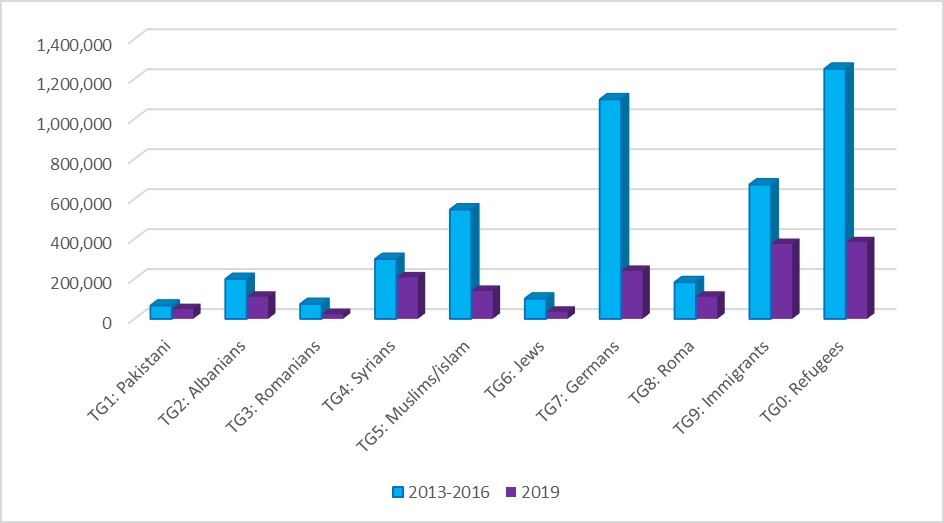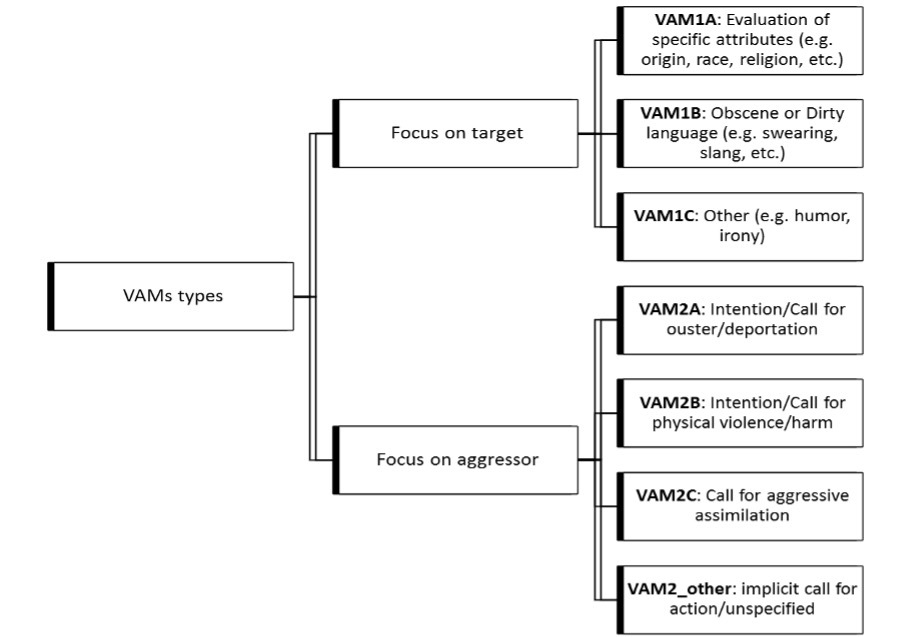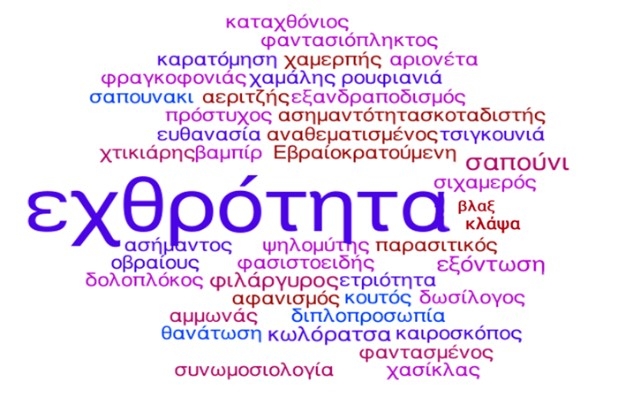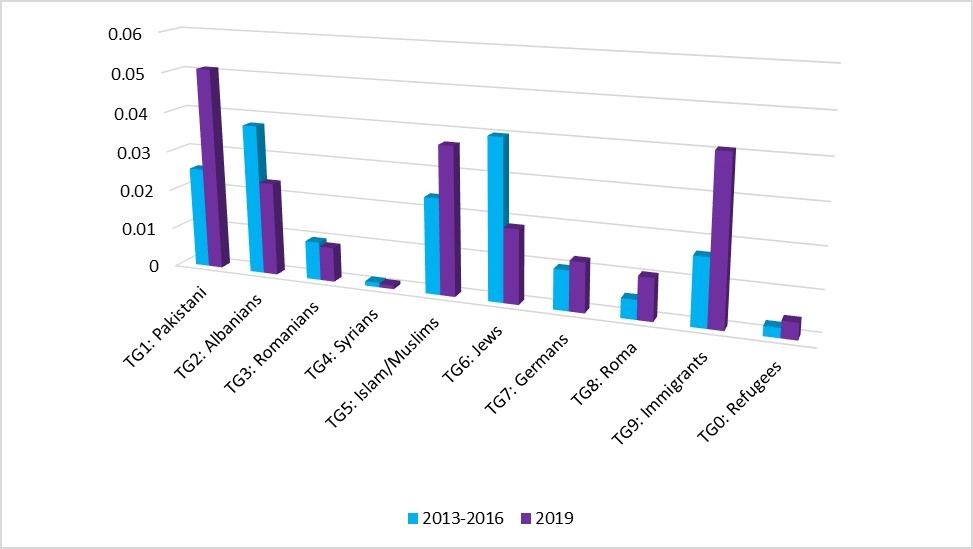The Project
The project presents a replication of a data-driven and linguistically inspired verbal aggression analysis framework that was designed to examine verbal attacks on Greek Twitter as an indicator of xenophobic attitudes between 2013 and 2016. This first study took place in the context of the XENO@GR project and covered a four-year period of the financial crisis in Greece and the beginning of the European refugee crisis. It examined verbal aggression towards specific groups of foreigners based on the common perception that xenophobia is a deeply-rooted social phenomenon that can escalate under circumstances of severe economic crisis.

Methodology
The methodology that was initially designed and applied to 2013-2016 Twitter data as part of the XENO@GR project was reapplied to 2019 Twitter data in the context of the SSHOC project.
First, based on criteria such as the population of specific ethnic groups or dominant prejudices about them in Greece, ten target groups of interest were defined: Pakistani, Albanians, Romanians, Syrians, Muslims/Islam, Jews, Germans, Roma, immigrants, and refugees.
Next, data was collected. For each target group, relevant Tweets were retrieved using related queries of keywords. The search function in the database configuration was stemmed, so the queries also returned Tweets containing morphological variations of the selected keywords. For the first study, a total of 4.490.572 Tweets were retrieved, while the search for the second retrieved 1.672.783 Tweets.

The data was then manually explored in order to identify different types of verbal aggression. This provided the basis for the design of a linguistically-driven framework, according to which aggressive messages were classified into groups and sub-groups, including their focus (on the target’s attributes or on the attacker’s thoughts), the type of linguistic weapon used for the attack (such as taboo or dirty language) and the content of the attack (such as threats or calls for physical violence or deportation).
The typology was designed to provide both quantitative and qualitative information about the verbal attacks, with details on the amount, type and content of the aggressive messages.
The data was modelled using a rule-based verbal aggression analyser. First, the raw data was processed through a natural language processing ( ) pipeline that performed tokenisation, sentence splitting, part-of-speech tagging, and lemmatisation using the ILSP suite of NLP tools for Greek, which is available through the CLARIN:EL infrastructure. The analyser then identified candidate verbal attacks and targets based on the respective lexical resources. Finally, sets of grammars of linguistic patterns determined which of the identified candidate attacks and targets were correct and classified them according to the typology. The data was then visualised in various ways in order to better explore and interpret the results.
Outcome
During the first study (2013-2016), the most discussed groups in the Twitter collections were refugees and Germans, reflecting the ongoing refugee crisis and the financial crisis respectively (Germany played a prominent role in the Greek financial crisis). However, the groups that were the main targets of verbal attacks were Jews, Albanians, Pakistani, Muslims/Islam, and immigrants. During this period, antisemitism appeared to be at the core of xenophobic discourse, which is also reflected in the Greek political landscape at this time, most notably the rise of the neo-Nazi party Golden Dawn, which had an explicitly antisemitic discourse. Overall, people framed as immigrants were more likely to be attacked than those framed as refugees, probably due to the different connotations with each group. The verbal attacks against Muslims/Islam appear to have been triggered by geopolitical events, such as the rise of ISIS in 2014.
In terms of content, the qualitative analysis confirmed the existence of stereotypes and prejudices against specific target groups that are deeply rooted in Greek society. For example, Jews were associated with the negative aspects of the banking system and global capitalism, and were seen as at least partly to blame for the Greek financial crisis. Albanians, meanwhile, were commonly associated with crime and cultural inferiority.

Based on these findings, xenophobia in Greece, as expressed verbally on Twitter against specific target groups, seems to be culturally rooted and not crisis driven. The qualitative analysis of the aggressive messages suggests a continuity of deeply rooted stereotypes about specific groups. However, the results also indicate the emergence of attacks that are associated with patterns concerning the attribution of blame about the Greek financial crisis. In other words, xenophobic attitudes may not have been crisis driven, but the economic crisis encouraged the development of defensive nationalism and the perception of vulnerability.
As for the refugee crisis, which was at its peak in 2015-2016, its effect on public beliefs remained an open question for future research. The few verbal attacks that were captured against refugees were mostly attempts to challenge their identity by implying they were illegal immigrants.
The results from the follow-up study in 2019 show a rearrangement of the main targets of attacks. While the main target groups are the same as in the previous study, they appear in a different order: whereas in 2013-2016, Jews and Albanians were top of the list, they are now in 5th and 4th place respectively. Instead, Pakistani, immigrants and Muslims/Islam are the three most attacked groups.
The fact that Jews were targeted less in the post-financial crisis era seems to confirm that, while culturally rooted stereotypes exist regardless of the context, the financial crisis contributed to the increase in verbal attacks against Jews in the earlier study. In addition, the neo-Nazi party Golden Dawn had been discredited by 2019, significantly weakening the main source of antisemitic discourse in Greece.

The increased rate of the verbal attacks against immigrants seems to coincide with the ongoing refugee crisis; as a main entry point for asylum seekers and migration in Europe, Greece is still struggling to cope with the migration flows, while the effects of this crisis are now tangible, especially at the overcrowded camps on the islands. The types and the content of the verbal attacks indicate that immigrants are mainly framed as illegal, inferior and unwelcome, similar to those in 2013-2016.
Messages targeting Muslims/Islam indicate an increase in islamophobic beliefs, compared to the earlier study. While the stereotypes associated with this target group are the same as in 2013-2016, the increase of the calls for deportation may indicate a qualitative difference.
Albanians and Pakistani constitute the largest immigrant populations in Greece. Albanians are perhaps the most established group of foreigners in Greek public discourse but, although more or less integrated in the Greek society, they are still a main target of xenophobic attitudes. The content of the verbal attacks against Pakistani immigrants suggests that the term Pakistani – and especially its derogatory morphological variations – seems to be used as a generic term for migrants from other Asian countries as well, such as Afghanistan, Bangladesh, or Iraq. Overall, the results suggest that the way in which these groups of foreigners were framed in 2019 may have changed. This possible reconstruction of the image of the foreigner in Greece remains an open question for future research.
Publications and Future Plans
The project team is currently working on the extension of the framework to other targets and domains through two case studies in the context of the SSHOC project. The first, a case study about verbal aggression as an aspect of political violence on Greek Twitter, covering a twenty-month period from 1 January 2019 to 31 August 2020 (including the highly polarised election period and the transfer of power after the Greek general elections of 2019, as well as the Covid-19 outbreak in 2020), was recently accepted for publication.
Focusing on specific types of verbal attacks against protagonist political actors in the Greek scene (Kyriakos Mitsotakis, Alexis Tsipras, New Democracy, and Syriza), the study provides insights regarding the levels, framing, and ideological orientation (left-wing vs. right-wing) of online aggression. The contextualisation of these attacks within the broader political environment in which they took place makes apparent the most invisible aspect of political violence, that is, symbolic violence.
An additional project, which will extend the computational framework to the English language through a case study of Donald Trump, is still in progress.
Views on CLARIN
Maria Pontiki, PhD, Scientific Associate at the Institute for Language and Speech Processing, Athena Research Center, Athens, Greece
Maria Gavriilidou, Researcher at the Institute for Language and Speech Processing, Athena Research Center, Athens, Greece
Dimitris Gkoumas, Scientific Associate at the Institute for Language and Speech Processing, Athena Research Center, Athens, Greece
Stelios Piperidis, Head of the Natural Language Processing and Language Infrastructures (NLPLI) Department of the Institute for Language and Speech Processing, Athena Research Center, Athens, Greece